Evaluating the Necessity of the Role of Operations Manager in PepsiCo
VerifiedAdded on 2022/10/01
|19
|5103
|30
Report
AI Summary
This report, prepared by Mundia Mundale, evaluates the necessity of the operations manager's role within PepsiCo, a company in the hospitality industry. It begins with an introduction to operations management and service operations management, followed by an examination of PepsiCo's service concept, strategic decisions, and service operations, including distribution, advertising, and promotion. The report details the roles and responsibilities of operations managers, such as planning, inventory management, procurement, quality control, and technology adoption. It then addresses challenges like globalization, sustainability, ethical conduct, and effective communication, along with proposed solutions such as service-oriented management. Furthermore, the report identifies challenges in recruitment, conflicts, customer satisfaction, and process improvement. Finally, the report identifies and discusses different management tools which contribute to success of the hospitality service operations company. It discusses different operational strategies such as customer-driven, corporate and cross-functional interactions, core competencies, and competitive priorities strategy. It also discusses other management tools like lean manufacturing, six sigma, reconfigurable manufacturing systems, behavioral operations management, and sustainability practices. The report concludes by highlighting the critical role of operations managers in ensuring efficiency, customer satisfaction, and competitive advantage within the company.
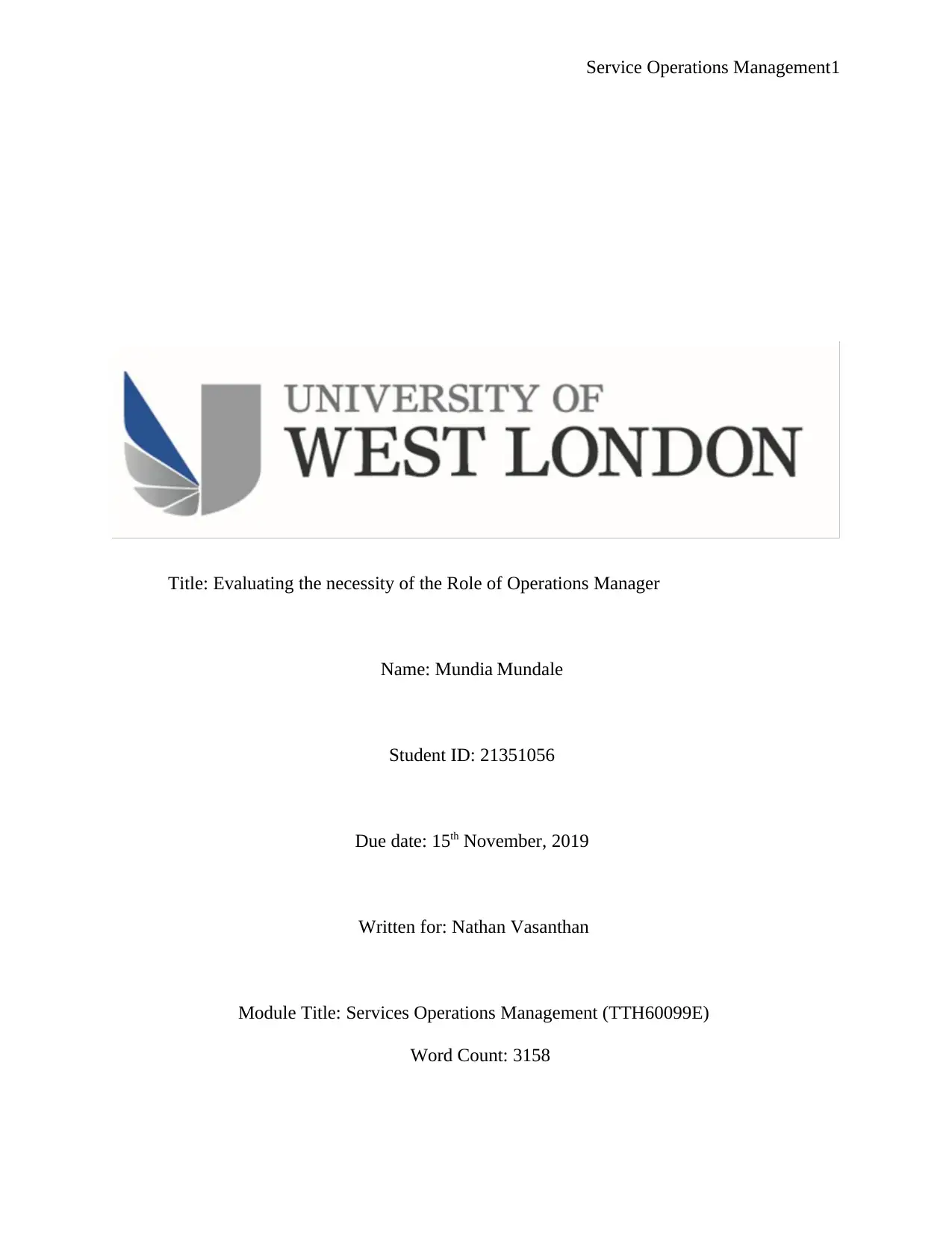
Service Operations Management1
Title: Evaluating the necessity of the Role of Operations Manager
Name: Mundia Mundale
Student ID: 21351056
Due date: 15th November, 2019
Written for: Nathan Vasanthan
Module Title: Services Operations Management (TTH60099E)
Word Count: 3158
Title: Evaluating the necessity of the Role of Operations Manager
Name: Mundia Mundale
Student ID: 21351056
Due date: 15th November, 2019
Written for: Nathan Vasanthan
Module Title: Services Operations Management (TTH60099E)
Word Count: 3158
Paraphrase This Document
Need a fresh take? Get an instant paraphrase of this document with our AI Paraphraser
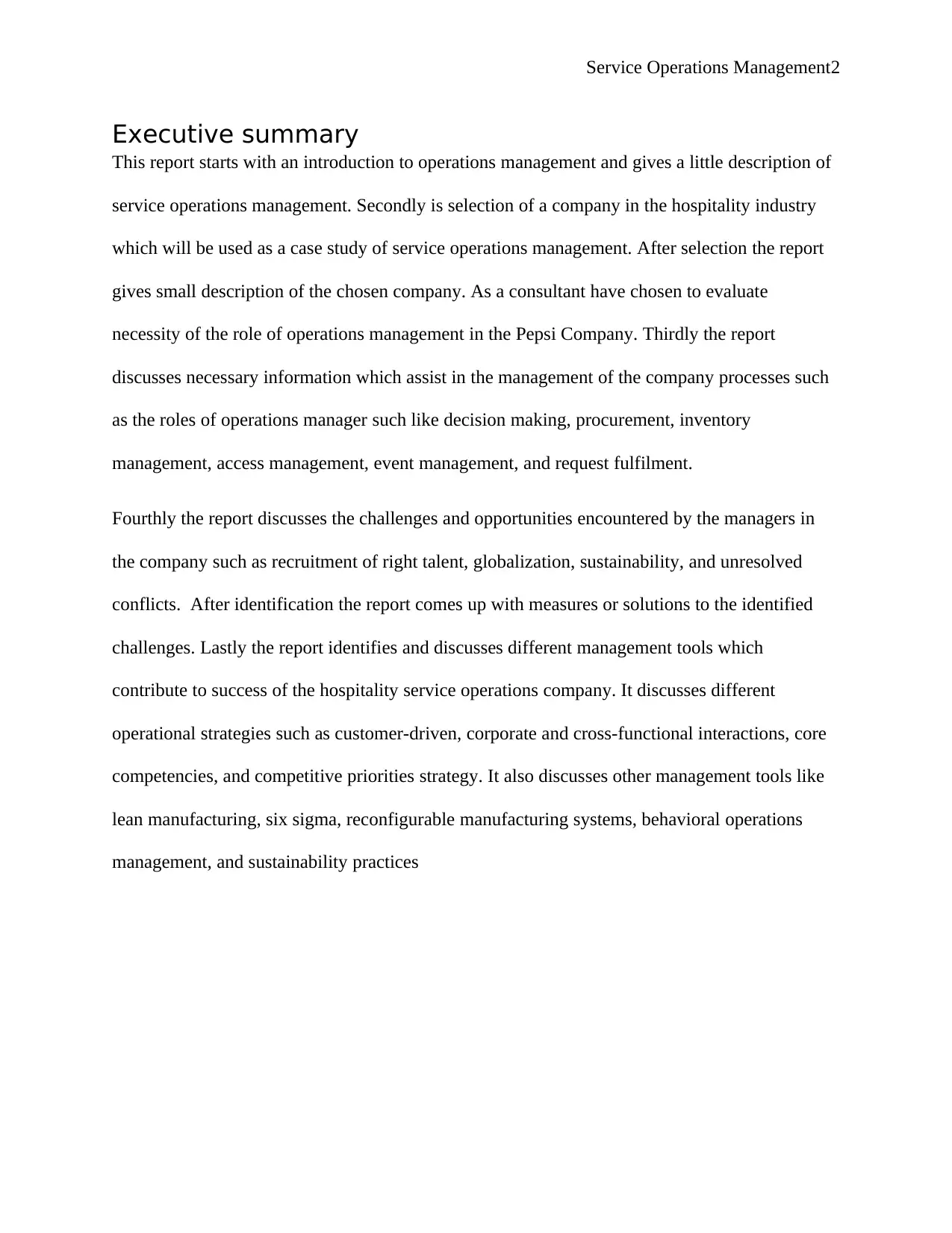
Service Operations Management2
Executive summary
This report starts with an introduction to operations management and gives a little description of
service operations management. Secondly is selection of a company in the hospitality industry
which will be used as a case study of service operations management. After selection the report
gives small description of the chosen company. As a consultant have chosen to evaluate
necessity of the role of operations management in the Pepsi Company. Thirdly the report
discusses necessary information which assist in the management of the company processes such
as the roles of operations manager such like decision making, procurement, inventory
management, access management, event management, and request fulfilment.
Fourthly the report discusses the challenges and opportunities encountered by the managers in
the company such as recruitment of right talent, globalization, sustainability, and unresolved
conflicts. After identification the report comes up with measures or solutions to the identified
challenges. Lastly the report identifies and discusses different management tools which
contribute to success of the hospitality service operations company. It discusses different
operational strategies such as customer-driven, corporate and cross-functional interactions, core
competencies, and competitive priorities strategy. It also discusses other management tools like
lean manufacturing, six sigma, reconfigurable manufacturing systems, behavioral operations
management, and sustainability practices
Executive summary
This report starts with an introduction to operations management and gives a little description of
service operations management. Secondly is selection of a company in the hospitality industry
which will be used as a case study of service operations management. After selection the report
gives small description of the chosen company. As a consultant have chosen to evaluate
necessity of the role of operations management in the Pepsi Company. Thirdly the report
discusses necessary information which assist in the management of the company processes such
as the roles of operations manager such like decision making, procurement, inventory
management, access management, event management, and request fulfilment.
Fourthly the report discusses the challenges and opportunities encountered by the managers in
the company such as recruitment of right talent, globalization, sustainability, and unresolved
conflicts. After identification the report comes up with measures or solutions to the identified
challenges. Lastly the report identifies and discusses different management tools which
contribute to success of the hospitality service operations company. It discusses different
operational strategies such as customer-driven, corporate and cross-functional interactions, core
competencies, and competitive priorities strategy. It also discusses other management tools like
lean manufacturing, six sigma, reconfigurable manufacturing systems, behavioral operations
management, and sustainability practices
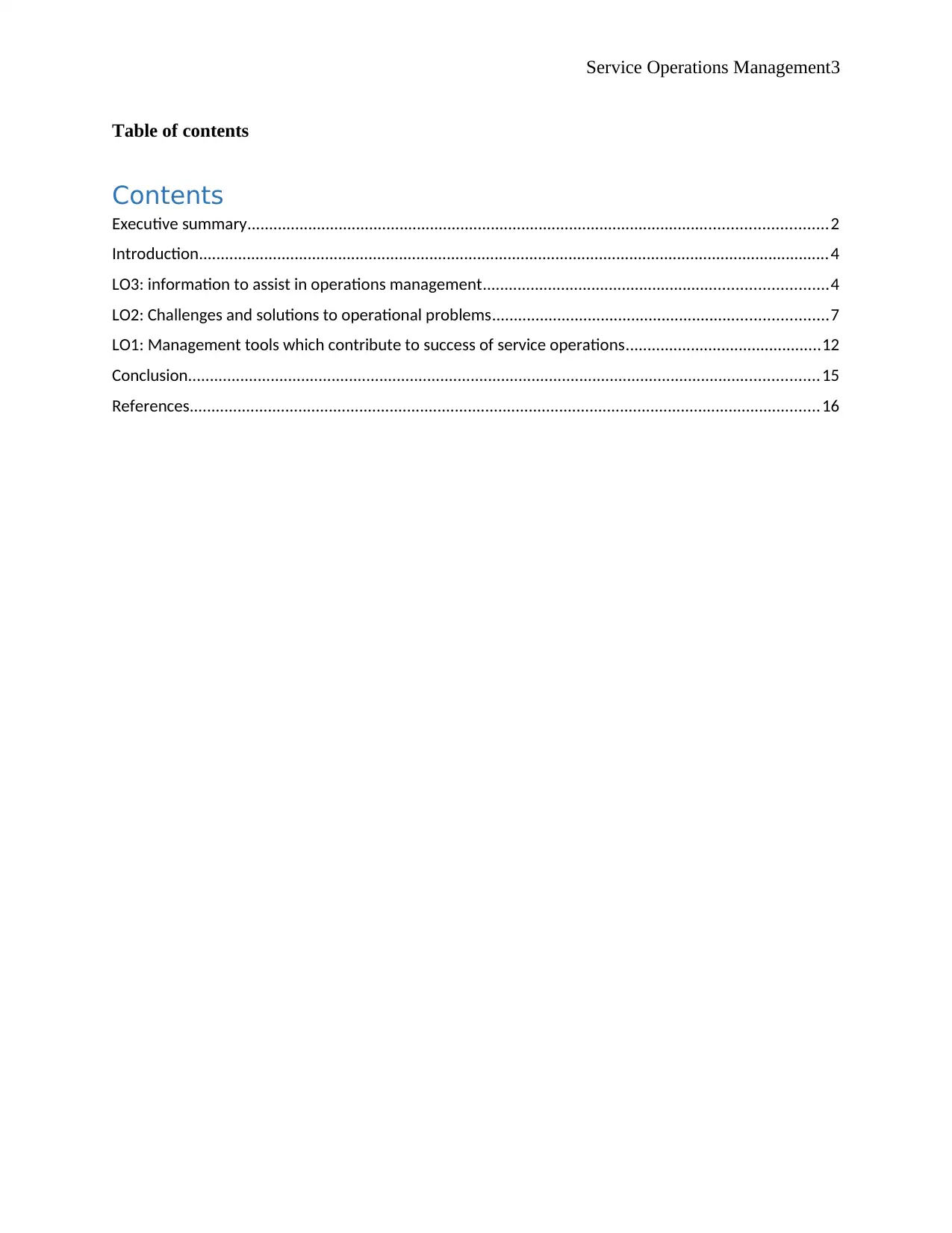
Service Operations Management3
Table of contents
Contents
Executive summary.....................................................................................................................................2
Introduction.................................................................................................................................................4
LO3: information to assist in operations management...............................................................................4
LO2: Challenges and solutions to operational problems.............................................................................7
LO1: Management tools which contribute to success of service operations.............................................12
Conclusion.................................................................................................................................................15
References.................................................................................................................................................16
Table of contents
Contents
Executive summary.....................................................................................................................................2
Introduction.................................................................................................................................................4
LO3: information to assist in operations management...............................................................................4
LO2: Challenges and solutions to operational problems.............................................................................7
LO1: Management tools which contribute to success of service operations.............................................12
Conclusion.................................................................................................................................................15
References.................................................................................................................................................16
⊘ This is a preview!⊘
Do you want full access?
Subscribe today to unlock all pages.

Trusted by 1+ million students worldwide
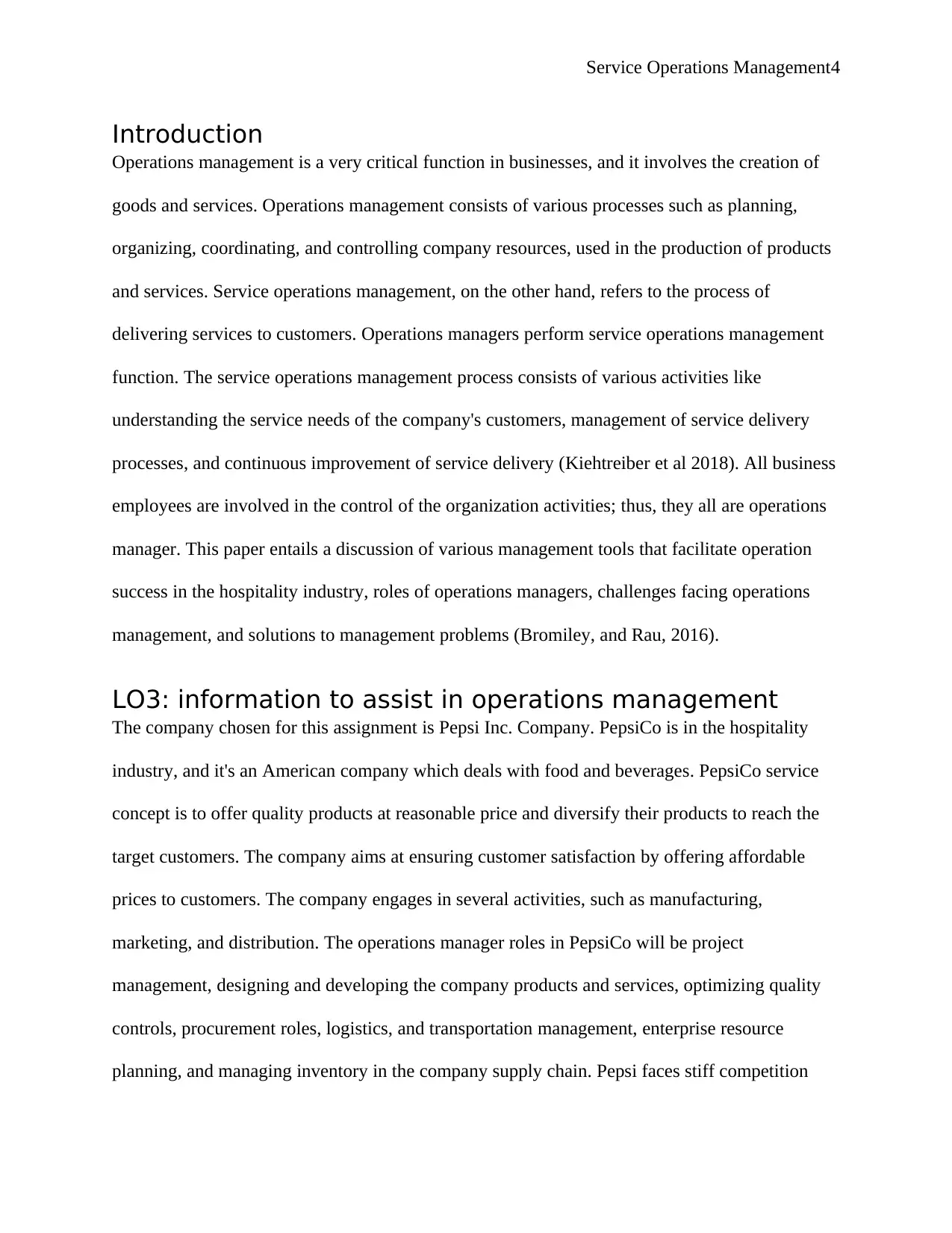
Service Operations Management4
Introduction
Operations management is a very critical function in businesses, and it involves the creation of
goods and services. Operations management consists of various processes such as planning,
organizing, coordinating, and controlling company resources, used in the production of products
and services. Service operations management, on the other hand, refers to the process of
delivering services to customers. Operations managers perform service operations management
function. The service operations management process consists of various activities like
understanding the service needs of the company's customers, management of service delivery
processes, and continuous improvement of service delivery (Kiehtreiber et al 2018). All business
employees are involved in the control of the organization activities; thus, they all are operations
manager. This paper entails a discussion of various management tools that facilitate operation
success in the hospitality industry, roles of operations managers, challenges facing operations
management, and solutions to management problems (Bromiley, and Rau, 2016).
LO3: information to assist in operations management
The company chosen for this assignment is Pepsi Inc. Company. PepsiCo is in the hospitality
industry, and it's an American company which deals with food and beverages. PepsiCo service
concept is to offer quality products at reasonable price and diversify their products to reach the
target customers. The company aims at ensuring customer satisfaction by offering affordable
prices to customers. The company engages in several activities, such as manufacturing,
marketing, and distribution. The operations manager roles in PepsiCo will be project
management, designing and developing the company products and services, optimizing quality
controls, procurement roles, logistics, and transportation management, enterprise resource
planning, and managing inventory in the company supply chain. Pepsi faces stiff competition
Introduction
Operations management is a very critical function in businesses, and it involves the creation of
goods and services. Operations management consists of various processes such as planning,
organizing, coordinating, and controlling company resources, used in the production of products
and services. Service operations management, on the other hand, refers to the process of
delivering services to customers. Operations managers perform service operations management
function. The service operations management process consists of various activities like
understanding the service needs of the company's customers, management of service delivery
processes, and continuous improvement of service delivery (Kiehtreiber et al 2018). All business
employees are involved in the control of the organization activities; thus, they all are operations
manager. This paper entails a discussion of various management tools that facilitate operation
success in the hospitality industry, roles of operations managers, challenges facing operations
management, and solutions to management problems (Bromiley, and Rau, 2016).
LO3: information to assist in operations management
The company chosen for this assignment is Pepsi Inc. Company. PepsiCo is in the hospitality
industry, and it's an American company which deals with food and beverages. PepsiCo service
concept is to offer quality products at reasonable price and diversify their products to reach the
target customers. The company aims at ensuring customer satisfaction by offering affordable
prices to customers. The company engages in several activities, such as manufacturing,
marketing, and distribution. The operations manager roles in PepsiCo will be project
management, designing and developing the company products and services, optimizing quality
controls, procurement roles, logistics, and transportation management, enterprise resource
planning, and managing inventory in the company supply chain. Pepsi faces stiff competition
Paraphrase This Document
Need a fresh take? Get an instant paraphrase of this document with our AI Paraphraser
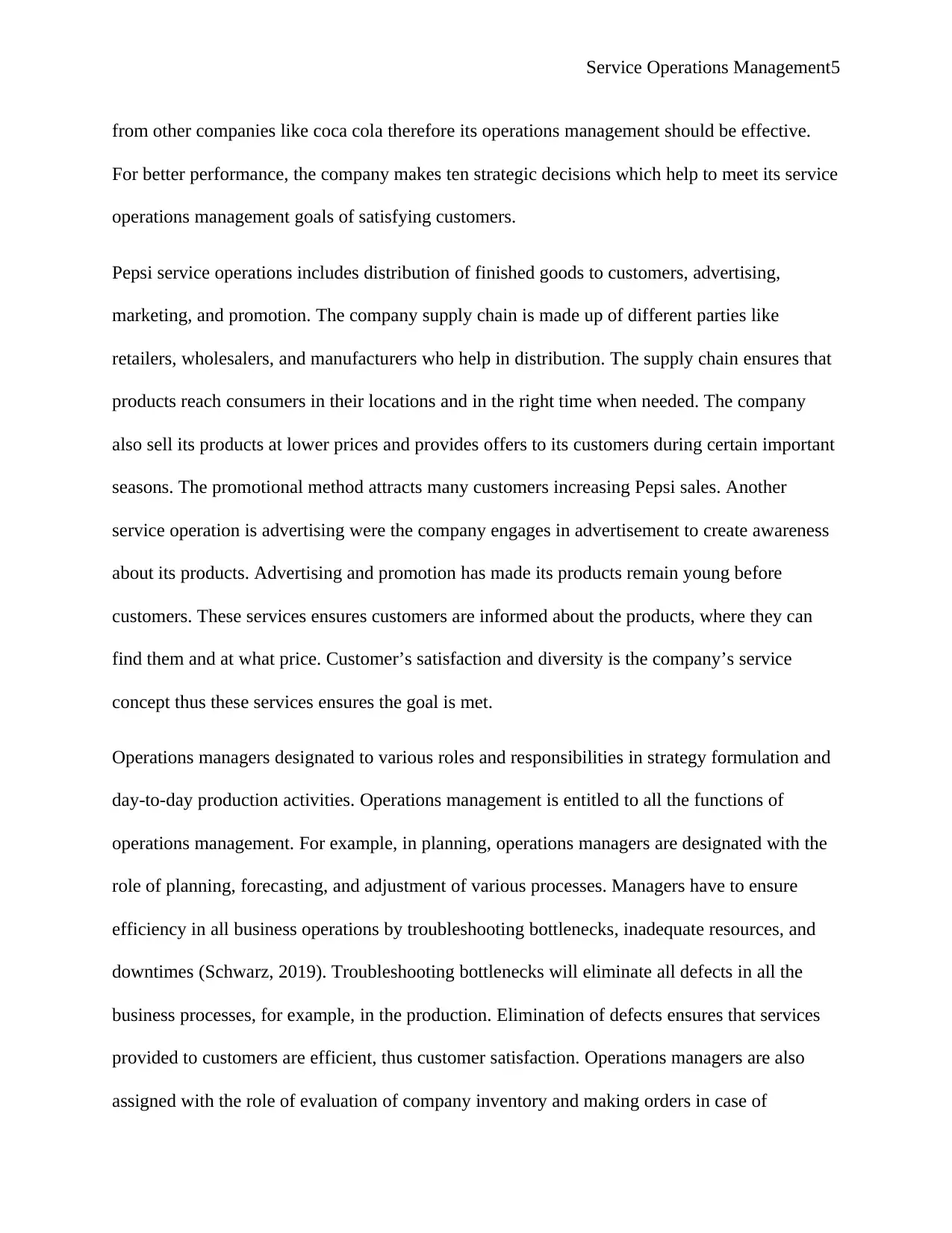
Service Operations Management5
from other companies like coca cola therefore its operations management should be effective.
For better performance, the company makes ten strategic decisions which help to meet its service
operations management goals of satisfying customers.
Pepsi service operations includes distribution of finished goods to customers, advertising,
marketing, and promotion. The company supply chain is made up of different parties like
retailers, wholesalers, and manufacturers who help in distribution. The supply chain ensures that
products reach consumers in their locations and in the right time when needed. The company
also sell its products at lower prices and provides offers to its customers during certain important
seasons. The promotional method attracts many customers increasing Pepsi sales. Another
service operation is advertising were the company engages in advertisement to create awareness
about its products. Advertising and promotion has made its products remain young before
customers. These services ensures customers are informed about the products, where they can
find them and at what price. Customer’s satisfaction and diversity is the company’s service
concept thus these services ensures the goal is met.
Operations managers designated to various roles and responsibilities in strategy formulation and
day-to-day production activities. Operations management is entitled to all the functions of
operations management. For example, in planning, operations managers are designated with the
role of planning, forecasting, and adjustment of various processes. Managers have to ensure
efficiency in all business operations by troubleshooting bottlenecks, inadequate resources, and
downtimes (Schwarz, 2019). Troubleshooting bottlenecks will eliminate all defects in all the
business processes, for example, in the production. Elimination of defects ensures that services
provided to customers are efficient, thus customer satisfaction. Operations managers are also
assigned with the role of evaluation of company inventory and making orders in case of
from other companies like coca cola therefore its operations management should be effective.
For better performance, the company makes ten strategic decisions which help to meet its service
operations management goals of satisfying customers.
Pepsi service operations includes distribution of finished goods to customers, advertising,
marketing, and promotion. The company supply chain is made up of different parties like
retailers, wholesalers, and manufacturers who help in distribution. The supply chain ensures that
products reach consumers in their locations and in the right time when needed. The company
also sell its products at lower prices and provides offers to its customers during certain important
seasons. The promotional method attracts many customers increasing Pepsi sales. Another
service operation is advertising were the company engages in advertisement to create awareness
about its products. Advertising and promotion has made its products remain young before
customers. These services ensures customers are informed about the products, where they can
find them and at what price. Customer’s satisfaction and diversity is the company’s service
concept thus these services ensures the goal is met.
Operations managers designated to various roles and responsibilities in strategy formulation and
day-to-day production activities. Operations management is entitled to all the functions of
operations management. For example, in planning, operations managers are designated with the
role of planning, forecasting, and adjustment of various processes. Managers have to ensure
efficiency in all business operations by troubleshooting bottlenecks, inadequate resources, and
downtimes (Schwarz, 2019). Troubleshooting bottlenecks will eliminate all defects in all the
business processes, for example, in the production. Elimination of defects ensures that services
provided to customers are efficient, thus customer satisfaction. Operations managers are also
assigned with the role of evaluation of company inventory and making orders in case of
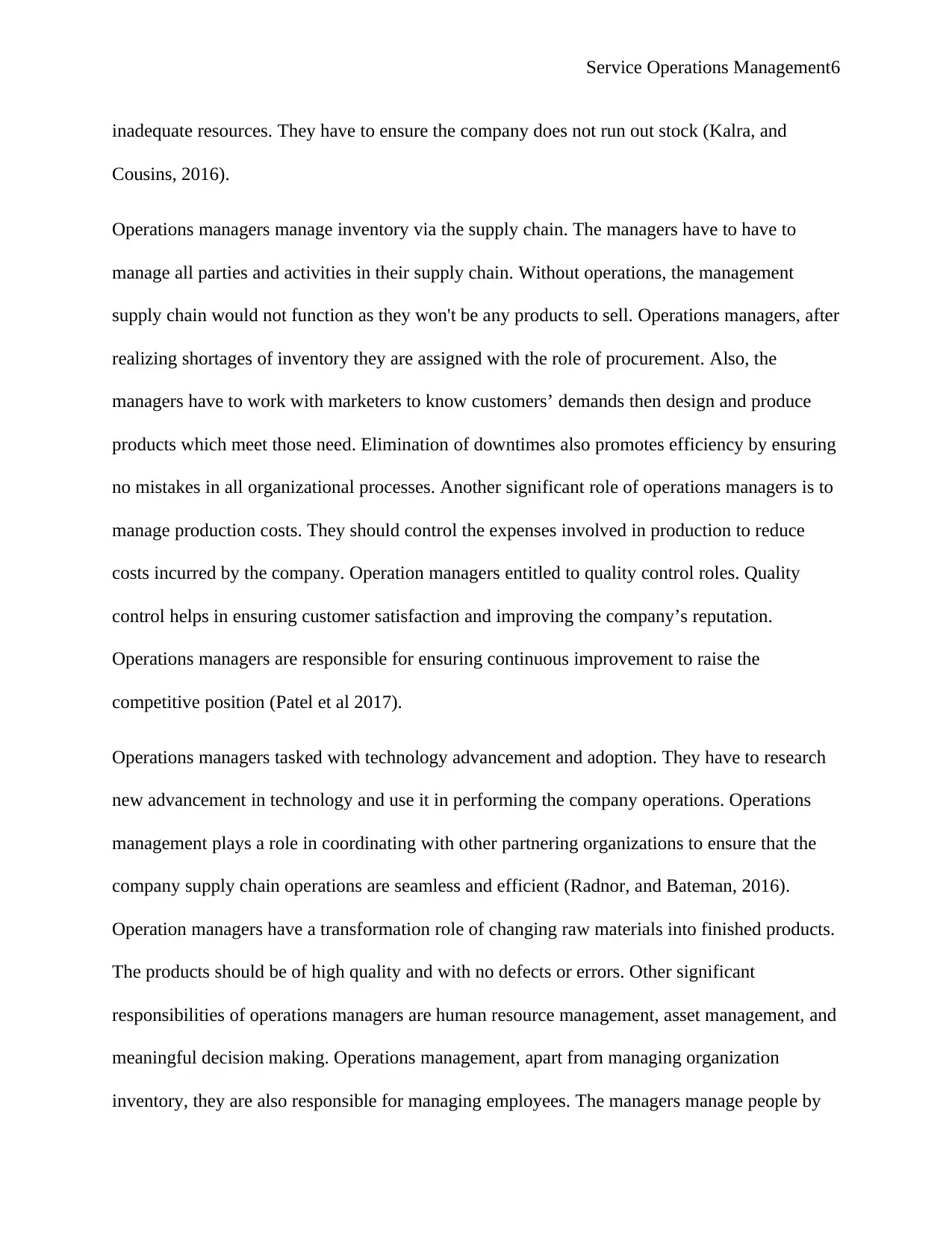
Service Operations Management6
inadequate resources. They have to ensure the company does not run out stock (Kalra, and
Cousins, 2016).
Operations managers manage inventory via the supply chain. The managers have to have to
manage all parties and activities in their supply chain. Without operations, the management
supply chain would not function as they won't be any products to sell. Operations managers, after
realizing shortages of inventory they are assigned with the role of procurement. Also, the
managers have to work with marketers to know customers’ demands then design and produce
products which meet those need. Elimination of downtimes also promotes efficiency by ensuring
no mistakes in all organizational processes. Another significant role of operations managers is to
manage production costs. They should control the expenses involved in production to reduce
costs incurred by the company. Operation managers entitled to quality control roles. Quality
control helps in ensuring customer satisfaction and improving the company’s reputation.
Operations managers are responsible for ensuring continuous improvement to raise the
competitive position (Patel et al 2017).
Operations managers tasked with technology advancement and adoption. They have to research
new advancement in technology and use it in performing the company operations. Operations
management plays a role in coordinating with other partnering organizations to ensure that the
company supply chain operations are seamless and efficient (Radnor, and Bateman, 2016).
Operation managers have a transformation role of changing raw materials into finished products.
The products should be of high quality and with no defects or errors. Other significant
responsibilities of operations managers are human resource management, asset management, and
meaningful decision making. Operations management, apart from managing organization
inventory, they are also responsible for managing employees. The managers manage people by
inadequate resources. They have to ensure the company does not run out stock (Kalra, and
Cousins, 2016).
Operations managers manage inventory via the supply chain. The managers have to have to
manage all parties and activities in their supply chain. Without operations, the management
supply chain would not function as they won't be any products to sell. Operations managers, after
realizing shortages of inventory they are assigned with the role of procurement. Also, the
managers have to work with marketers to know customers’ demands then design and produce
products which meet those need. Elimination of downtimes also promotes efficiency by ensuring
no mistakes in all organizational processes. Another significant role of operations managers is to
manage production costs. They should control the expenses involved in production to reduce
costs incurred by the company. Operation managers entitled to quality control roles. Quality
control helps in ensuring customer satisfaction and improving the company’s reputation.
Operations managers are responsible for ensuring continuous improvement to raise the
competitive position (Patel et al 2017).
Operations managers tasked with technology advancement and adoption. They have to research
new advancement in technology and use it in performing the company operations. Operations
management plays a role in coordinating with other partnering organizations to ensure that the
company supply chain operations are seamless and efficient (Radnor, and Bateman, 2016).
Operation managers have a transformation role of changing raw materials into finished products.
The products should be of high quality and with no defects or errors. Other significant
responsibilities of operations managers are human resource management, asset management, and
meaningful decision making. Operations management, apart from managing organization
inventory, they are also responsible for managing employees. The managers manage people by
⊘ This is a preview!⊘
Do you want full access?
Subscribe today to unlock all pages.

Trusted by 1+ million students worldwide
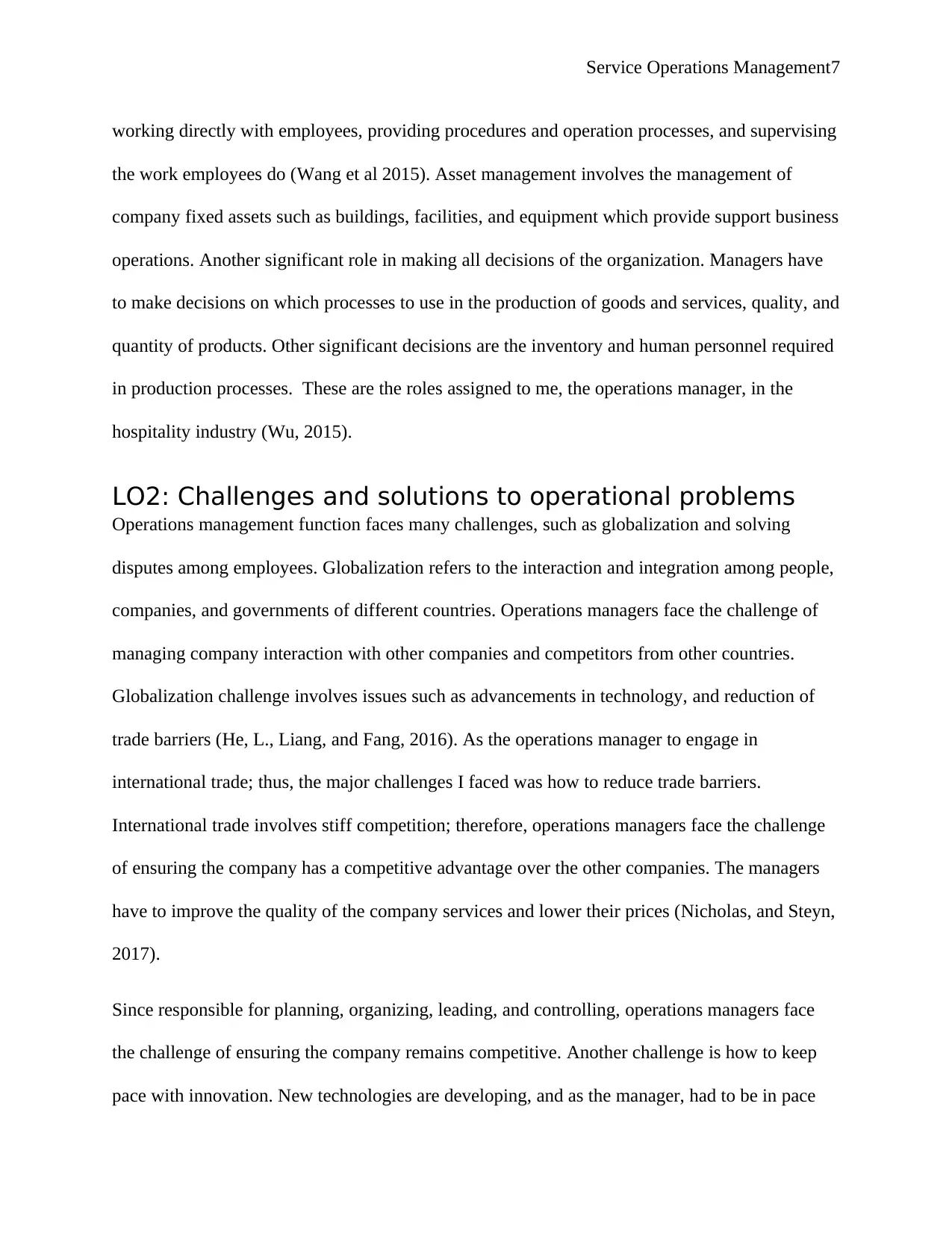
Service Operations Management7
working directly with employees, providing procedures and operation processes, and supervising
the work employees do (Wang et al 2015). Asset management involves the management of
company fixed assets such as buildings, facilities, and equipment which provide support business
operations. Another significant role in making all decisions of the organization. Managers have
to make decisions on which processes to use in the production of goods and services, quality, and
quantity of products. Other significant decisions are the inventory and human personnel required
in production processes. These are the roles assigned to me, the operations manager, in the
hospitality industry (Wu, 2015).
LO2: Challenges and solutions to operational problems
Operations management function faces many challenges, such as globalization and solving
disputes among employees. Globalization refers to the interaction and integration among people,
companies, and governments of different countries. Operations managers face the challenge of
managing company interaction with other companies and competitors from other countries.
Globalization challenge involves issues such as advancements in technology, and reduction of
trade barriers (He, L., Liang, and Fang, 2016). As the operations manager to engage in
international trade; thus, the major challenges I faced was how to reduce trade barriers.
International trade involves stiff competition; therefore, operations managers face the challenge
of ensuring the company has a competitive advantage over the other companies. The managers
have to improve the quality of the company services and lower their prices (Nicholas, and Steyn,
2017).
Since responsible for planning, organizing, leading, and controlling, operations managers face
the challenge of ensuring the company remains competitive. Another challenge is how to keep
pace with innovation. New technologies are developing, and as the manager, had to be in pace
working directly with employees, providing procedures and operation processes, and supervising
the work employees do (Wang et al 2015). Asset management involves the management of
company fixed assets such as buildings, facilities, and equipment which provide support business
operations. Another significant role in making all decisions of the organization. Managers have
to make decisions on which processes to use in the production of goods and services, quality, and
quantity of products. Other significant decisions are the inventory and human personnel required
in production processes. These are the roles assigned to me, the operations manager, in the
hospitality industry (Wu, 2015).
LO2: Challenges and solutions to operational problems
Operations management function faces many challenges, such as globalization and solving
disputes among employees. Globalization refers to the interaction and integration among people,
companies, and governments of different countries. Operations managers face the challenge of
managing company interaction with other companies and competitors from other countries.
Globalization challenge involves issues such as advancements in technology, and reduction of
trade barriers (He, L., Liang, and Fang, 2016). As the operations manager to engage in
international trade; thus, the major challenges I faced was how to reduce trade barriers.
International trade involves stiff competition; therefore, operations managers face the challenge
of ensuring the company has a competitive advantage over the other companies. The managers
have to improve the quality of the company services and lower their prices (Nicholas, and Steyn,
2017).
Since responsible for planning, organizing, leading, and controlling, operations managers face
the challenge of ensuring the company remains competitive. Another challenge is how to keep
pace with innovation. New technologies are developing, and as the manager, had to be in pace
Paraphrase This Document
Need a fresh take? Get an instant paraphrase of this document with our AI Paraphraser
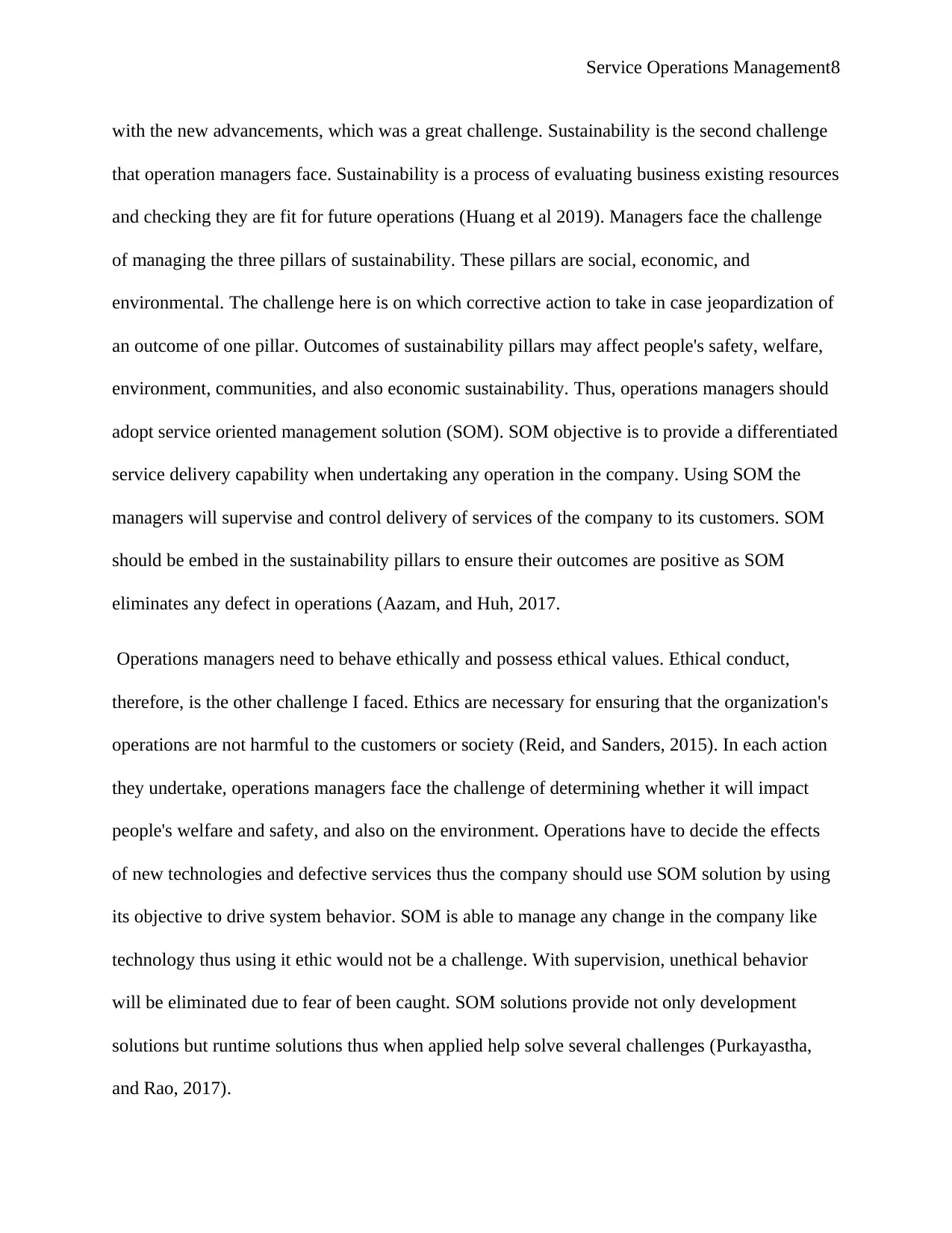
Service Operations Management8
with the new advancements, which was a great challenge. Sustainability is the second challenge
that operation managers face. Sustainability is a process of evaluating business existing resources
and checking they are fit for future operations (Huang et al 2019). Managers face the challenge
of managing the three pillars of sustainability. These pillars are social, economic, and
environmental. The challenge here is on which corrective action to take in case jeopardization of
an outcome of one pillar. Outcomes of sustainability pillars may affect people's safety, welfare,
environment, communities, and also economic sustainability. Thus, operations managers should
adopt service oriented management solution (SOM). SOM objective is to provide a differentiated
service delivery capability when undertaking any operation in the company. Using SOM the
managers will supervise and control delivery of services of the company to its customers. SOM
should be embed in the sustainability pillars to ensure their outcomes are positive as SOM
eliminates any defect in operations (Aazam, and Huh, 2017.
Operations managers need to behave ethically and possess ethical values. Ethical conduct,
therefore, is the other challenge I faced. Ethics are necessary for ensuring that the organization's
operations are not harmful to the customers or society (Reid, and Sanders, 2015). In each action
they undertake, operations managers face the challenge of determining whether it will impact
people's welfare and safety, and also on the environment. Operations have to decide the effects
of new technologies and defective services thus the company should use SOM solution by using
its objective to drive system behavior. SOM is able to manage any change in the company like
technology thus using it ethic would not be a challenge. With supervision, unethical behavior
will be eliminated due to fear of been caught. SOM solutions provide not only development
solutions but runtime solutions thus when applied help solve several challenges (Purkayastha,
and Rao, 2017).
with the new advancements, which was a great challenge. Sustainability is the second challenge
that operation managers face. Sustainability is a process of evaluating business existing resources
and checking they are fit for future operations (Huang et al 2019). Managers face the challenge
of managing the three pillars of sustainability. These pillars are social, economic, and
environmental. The challenge here is on which corrective action to take in case jeopardization of
an outcome of one pillar. Outcomes of sustainability pillars may affect people's safety, welfare,
environment, communities, and also economic sustainability. Thus, operations managers should
adopt service oriented management solution (SOM). SOM objective is to provide a differentiated
service delivery capability when undertaking any operation in the company. Using SOM the
managers will supervise and control delivery of services of the company to its customers. SOM
should be embed in the sustainability pillars to ensure their outcomes are positive as SOM
eliminates any defect in operations (Aazam, and Huh, 2017.
Operations managers need to behave ethically and possess ethical values. Ethical conduct,
therefore, is the other challenge I faced. Ethics are necessary for ensuring that the organization's
operations are not harmful to the customers or society (Reid, and Sanders, 2015). In each action
they undertake, operations managers face the challenge of determining whether it will impact
people's welfare and safety, and also on the environment. Operations have to decide the effects
of new technologies and defective services thus the company should use SOM solution by using
its objective to drive system behavior. SOM is able to manage any change in the company like
technology thus using it ethic would not be a challenge. With supervision, unethical behavior
will be eliminated due to fear of been caught. SOM solutions provide not only development
solutions but runtime solutions thus when applied help solve several challenges (Purkayastha,
and Rao, 2017).
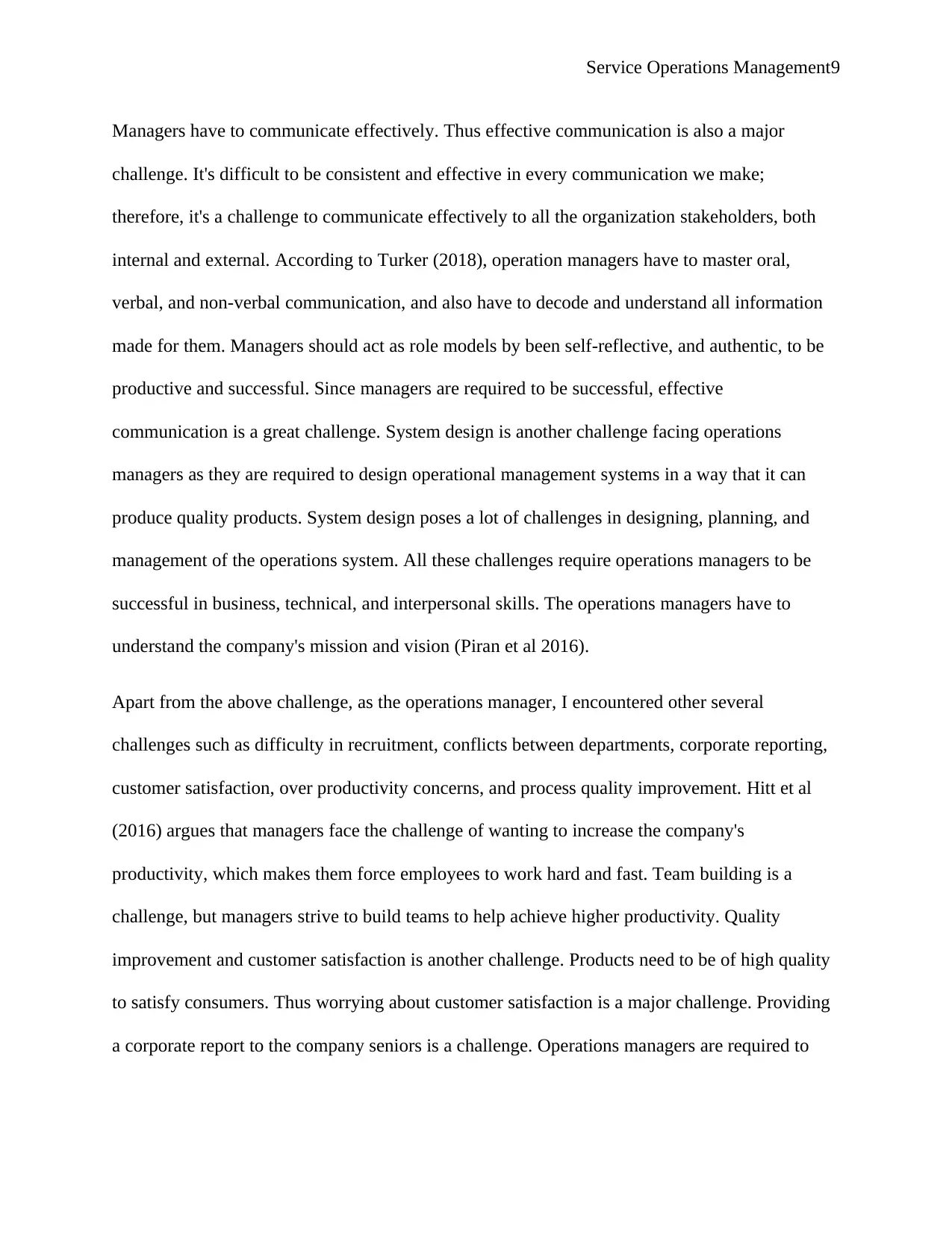
Service Operations Management9
Managers have to communicate effectively. Thus effective communication is also a major
challenge. It's difficult to be consistent and effective in every communication we make;
therefore, it's a challenge to communicate effectively to all the organization stakeholders, both
internal and external. According to Turker (2018), operation managers have to master oral,
verbal, and non-verbal communication, and also have to decode and understand all information
made for them. Managers should act as role models by been self-reflective, and authentic, to be
productive and successful. Since managers are required to be successful, effective
communication is a great challenge. System design is another challenge facing operations
managers as they are required to design operational management systems in a way that it can
produce quality products. System design poses a lot of challenges in designing, planning, and
management of the operations system. All these challenges require operations managers to be
successful in business, technical, and interpersonal skills. The operations managers have to
understand the company's mission and vision (Piran et al 2016).
Apart from the above challenge, as the operations manager, I encountered other several
challenges such as difficulty in recruitment, conflicts between departments, corporate reporting,
customer satisfaction, over productivity concerns, and process quality improvement. Hitt et al
(2016) argues that managers face the challenge of wanting to increase the company's
productivity, which makes them force employees to work hard and fast. Team building is a
challenge, but managers strive to build teams to help achieve higher productivity. Quality
improvement and customer satisfaction is another challenge. Products need to be of high quality
to satisfy consumers. Thus worrying about customer satisfaction is a major challenge. Providing
a corporate report to the company seniors is a challenge. Operations managers are required to
Managers have to communicate effectively. Thus effective communication is also a major
challenge. It's difficult to be consistent and effective in every communication we make;
therefore, it's a challenge to communicate effectively to all the organization stakeholders, both
internal and external. According to Turker (2018), operation managers have to master oral,
verbal, and non-verbal communication, and also have to decode and understand all information
made for them. Managers should act as role models by been self-reflective, and authentic, to be
productive and successful. Since managers are required to be successful, effective
communication is a great challenge. System design is another challenge facing operations
managers as they are required to design operational management systems in a way that it can
produce quality products. System design poses a lot of challenges in designing, planning, and
management of the operations system. All these challenges require operations managers to be
successful in business, technical, and interpersonal skills. The operations managers have to
understand the company's mission and vision (Piran et al 2016).
Apart from the above challenge, as the operations manager, I encountered other several
challenges such as difficulty in recruitment, conflicts between departments, corporate reporting,
customer satisfaction, over productivity concerns, and process quality improvement. Hitt et al
(2016) argues that managers face the challenge of wanting to increase the company's
productivity, which makes them force employees to work hard and fast. Team building is a
challenge, but managers strive to build teams to help achieve higher productivity. Quality
improvement and customer satisfaction is another challenge. Products need to be of high quality
to satisfy consumers. Thus worrying about customer satisfaction is a major challenge. Providing
a corporate report to the company seniors is a challenge. Operations managers are required to
⊘ This is a preview!⊘
Do you want full access?
Subscribe today to unlock all pages.

Trusted by 1+ million students worldwide
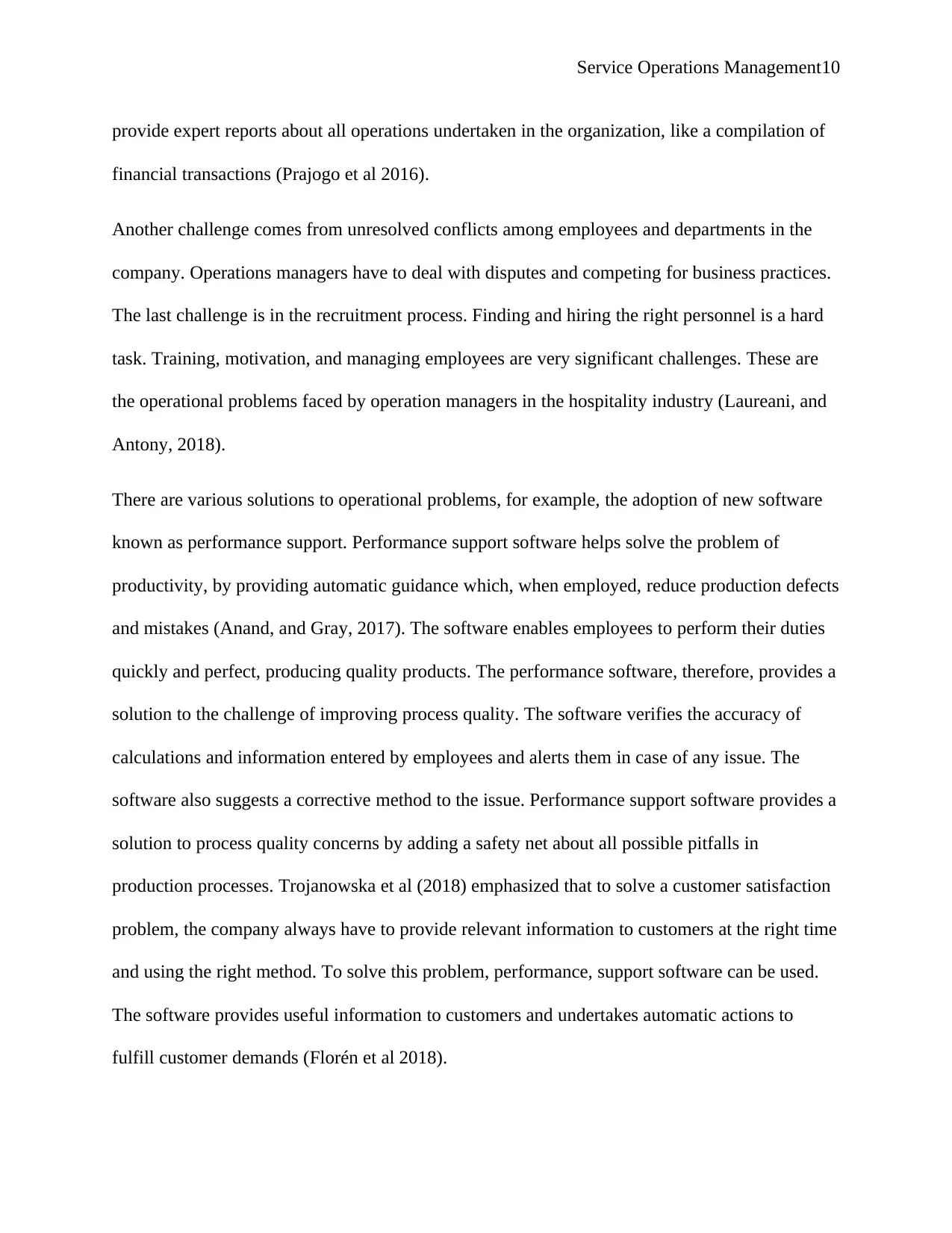
Service Operations Management10
provide expert reports about all operations undertaken in the organization, like a compilation of
financial transactions (Prajogo et al 2016).
Another challenge comes from unresolved conflicts among employees and departments in the
company. Operations managers have to deal with disputes and competing for business practices.
The last challenge is in the recruitment process. Finding and hiring the right personnel is a hard
task. Training, motivation, and managing employees are very significant challenges. These are
the operational problems faced by operation managers in the hospitality industry (Laureani, and
Antony, 2018).
There are various solutions to operational problems, for example, the adoption of new software
known as performance support. Performance support software helps solve the problem of
productivity, by providing automatic guidance which, when employed, reduce production defects
and mistakes (Anand, and Gray, 2017). The software enables employees to perform their duties
quickly and perfect, producing quality products. The performance software, therefore, provides a
solution to the challenge of improving process quality. The software verifies the accuracy of
calculations and information entered by employees and alerts them in case of any issue. The
software also suggests a corrective method to the issue. Performance support software provides a
solution to process quality concerns by adding a safety net about all possible pitfalls in
production processes. Trojanowska et al (2018) emphasized that to solve a customer satisfaction
problem, the company always have to provide relevant information to customers at the right time
and using the right method. To solve this problem, performance, support software can be used.
The software provides useful information to customers and undertakes automatic actions to
fulfill customer demands (Florén et al 2018).
provide expert reports about all operations undertaken in the organization, like a compilation of
financial transactions (Prajogo et al 2016).
Another challenge comes from unresolved conflicts among employees and departments in the
company. Operations managers have to deal with disputes and competing for business practices.
The last challenge is in the recruitment process. Finding and hiring the right personnel is a hard
task. Training, motivation, and managing employees are very significant challenges. These are
the operational problems faced by operation managers in the hospitality industry (Laureani, and
Antony, 2018).
There are various solutions to operational problems, for example, the adoption of new software
known as performance support. Performance support software helps solve the problem of
productivity, by providing automatic guidance which, when employed, reduce production defects
and mistakes (Anand, and Gray, 2017). The software enables employees to perform their duties
quickly and perfect, producing quality products. The performance software, therefore, provides a
solution to the challenge of improving process quality. The software verifies the accuracy of
calculations and information entered by employees and alerts them in case of any issue. The
software also suggests a corrective method to the issue. Performance support software provides a
solution to process quality concerns by adding a safety net about all possible pitfalls in
production processes. Trojanowska et al (2018) emphasized that to solve a customer satisfaction
problem, the company always have to provide relevant information to customers at the right time
and using the right method. To solve this problem, performance, support software can be used.
The software provides useful information to customers and undertakes automatic actions to
fulfill customer demands (Florén et al 2018).
Paraphrase This Document
Need a fresh take? Get an instant paraphrase of this document with our AI Paraphraser
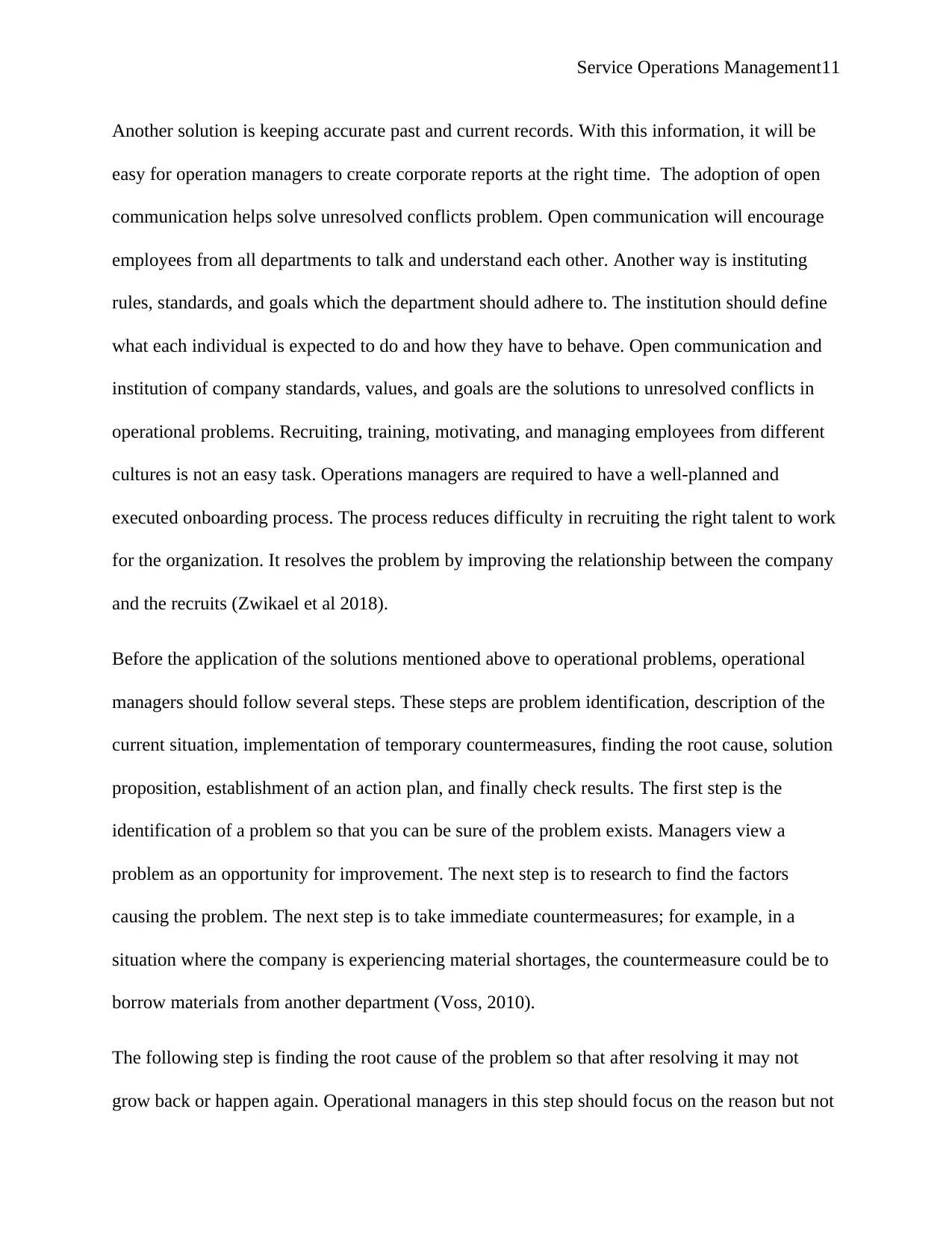
Service Operations Management11
Another solution is keeping accurate past and current records. With this information, it will be
easy for operation managers to create corporate reports at the right time. The adoption of open
communication helps solve unresolved conflicts problem. Open communication will encourage
employees from all departments to talk and understand each other. Another way is instituting
rules, standards, and goals which the department should adhere to. The institution should define
what each individual is expected to do and how they have to behave. Open communication and
institution of company standards, values, and goals are the solutions to unresolved conflicts in
operational problems. Recruiting, training, motivating, and managing employees from different
cultures is not an easy task. Operations managers are required to have a well-planned and
executed onboarding process. The process reduces difficulty in recruiting the right talent to work
for the organization. It resolves the problem by improving the relationship between the company
and the recruits (Zwikael et al 2018).
Before the application of the solutions mentioned above to operational problems, operational
managers should follow several steps. These steps are problem identification, description of the
current situation, implementation of temporary countermeasures, finding the root cause, solution
proposition, establishment of an action plan, and finally check results. The first step is the
identification of a problem so that you can be sure of the problem exists. Managers view a
problem as an opportunity for improvement. The next step is to research to find the factors
causing the problem. The next step is to take immediate countermeasures; for example, in a
situation where the company is experiencing material shortages, the countermeasure could be to
borrow materials from another department (Voss, 2010).
The following step is finding the root cause of the problem so that after resolving it may not
grow back or happen again. Operational managers in this step should focus on the reason but not
Another solution is keeping accurate past and current records. With this information, it will be
easy for operation managers to create corporate reports at the right time. The adoption of open
communication helps solve unresolved conflicts problem. Open communication will encourage
employees from all departments to talk and understand each other. Another way is instituting
rules, standards, and goals which the department should adhere to. The institution should define
what each individual is expected to do and how they have to behave. Open communication and
institution of company standards, values, and goals are the solutions to unresolved conflicts in
operational problems. Recruiting, training, motivating, and managing employees from different
cultures is not an easy task. Operations managers are required to have a well-planned and
executed onboarding process. The process reduces difficulty in recruiting the right talent to work
for the organization. It resolves the problem by improving the relationship between the company
and the recruits (Zwikael et al 2018).
Before the application of the solutions mentioned above to operational problems, operational
managers should follow several steps. These steps are problem identification, description of the
current situation, implementation of temporary countermeasures, finding the root cause, solution
proposition, establishment of an action plan, and finally check results. The first step is the
identification of a problem so that you can be sure of the problem exists. Managers view a
problem as an opportunity for improvement. The next step is to research to find the factors
causing the problem. The next step is to take immediate countermeasures; for example, in a
situation where the company is experiencing material shortages, the countermeasure could be to
borrow materials from another department (Voss, 2010).
The following step is finding the root cause of the problem so that after resolving it may not
grow back or happen again. Operational managers in this step should focus on the reason but not
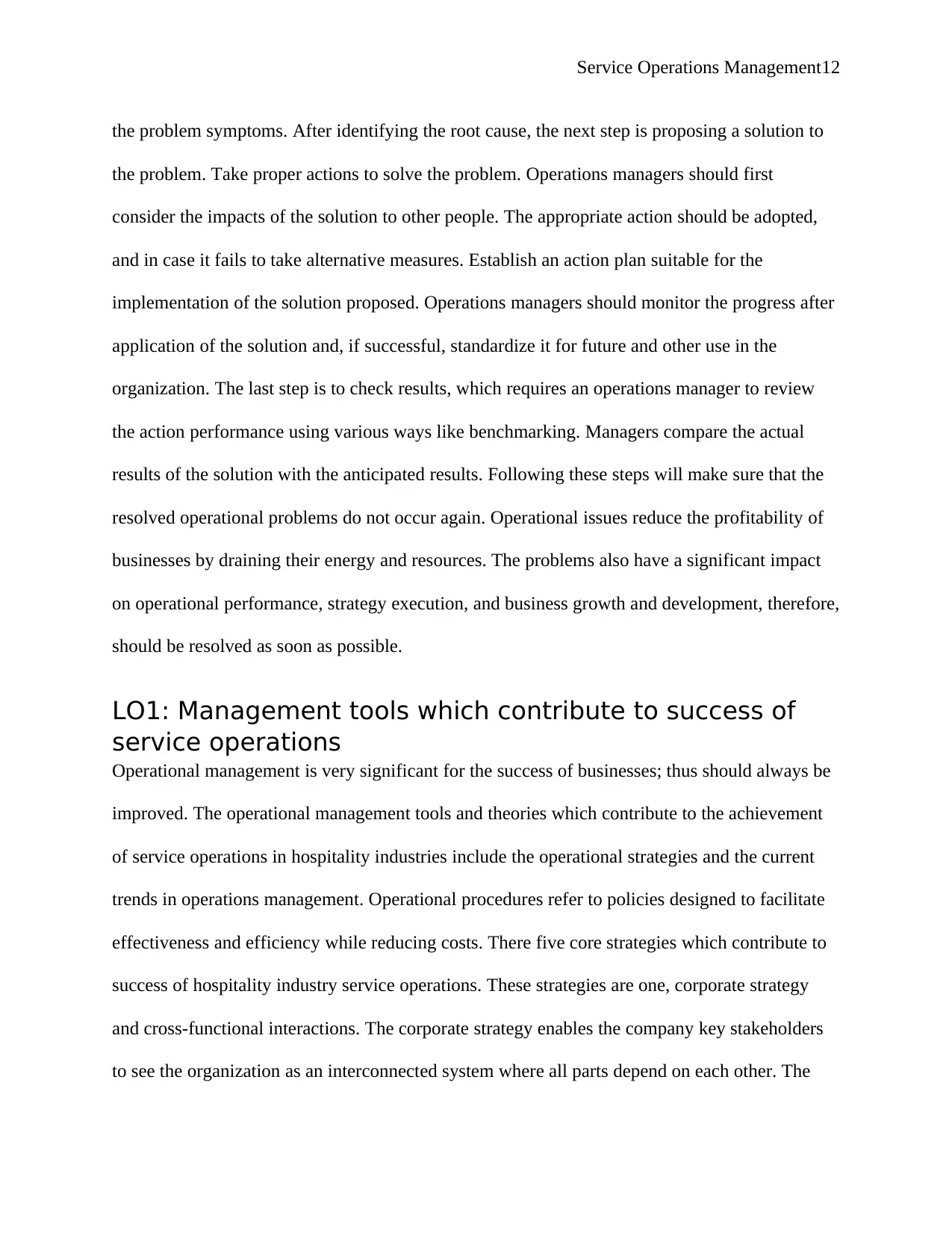
Service Operations Management12
the problem symptoms. After identifying the root cause, the next step is proposing a solution to
the problem. Take proper actions to solve the problem. Operations managers should first
consider the impacts of the solution to other people. The appropriate action should be adopted,
and in case it fails to take alternative measures. Establish an action plan suitable for the
implementation of the solution proposed. Operations managers should monitor the progress after
application of the solution and, if successful, standardize it for future and other use in the
organization. The last step is to check results, which requires an operations manager to review
the action performance using various ways like benchmarking. Managers compare the actual
results of the solution with the anticipated results. Following these steps will make sure that the
resolved operational problems do not occur again. Operational issues reduce the profitability of
businesses by draining their energy and resources. The problems also have a significant impact
on operational performance, strategy execution, and business growth and development, therefore,
should be resolved as soon as possible.
LO1: Management tools which contribute to success of
service operations
Operational management is very significant for the success of businesses; thus should always be
improved. The operational management tools and theories which contribute to the achievement
of service operations in hospitality industries include the operational strategies and the current
trends in operations management. Operational procedures refer to policies designed to facilitate
effectiveness and efficiency while reducing costs. There five core strategies which contribute to
success of hospitality industry service operations. These strategies are one, corporate strategy
and cross-functional interactions. The corporate strategy enables the company key stakeholders
to see the organization as an interconnected system where all parts depend on each other. The
the problem symptoms. After identifying the root cause, the next step is proposing a solution to
the problem. Take proper actions to solve the problem. Operations managers should first
consider the impacts of the solution to other people. The appropriate action should be adopted,
and in case it fails to take alternative measures. Establish an action plan suitable for the
implementation of the solution proposed. Operations managers should monitor the progress after
application of the solution and, if successful, standardize it for future and other use in the
organization. The last step is to check results, which requires an operations manager to review
the action performance using various ways like benchmarking. Managers compare the actual
results of the solution with the anticipated results. Following these steps will make sure that the
resolved operational problems do not occur again. Operational issues reduce the profitability of
businesses by draining their energy and resources. The problems also have a significant impact
on operational performance, strategy execution, and business growth and development, therefore,
should be resolved as soon as possible.
LO1: Management tools which contribute to success of
service operations
Operational management is very significant for the success of businesses; thus should always be
improved. The operational management tools and theories which contribute to the achievement
of service operations in hospitality industries include the operational strategies and the current
trends in operations management. Operational procedures refer to policies designed to facilitate
effectiveness and efficiency while reducing costs. There five core strategies which contribute to
success of hospitality industry service operations. These strategies are one, corporate strategy
and cross-functional interactions. The corporate strategy enables the company key stakeholders
to see the organization as an interconnected system where all parts depend on each other. The
⊘ This is a preview!⊘
Do you want full access?
Subscribe today to unlock all pages.

Trusted by 1+ million students worldwide
1 out of 19
Related Documents
Your All-in-One AI-Powered Toolkit for Academic Success.
+13062052269
info@desklib.com
Available 24*7 on WhatsApp / Email
![[object Object]](/_next/static/media/star-bottom.7253800d.svg)
Unlock your academic potential
Copyright © 2020–2026 A2Z Services. All Rights Reserved. Developed and managed by ZUCOL.





